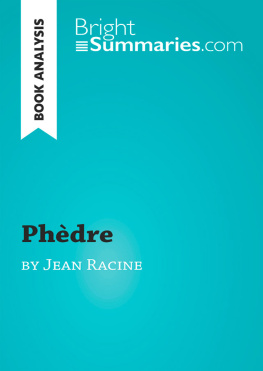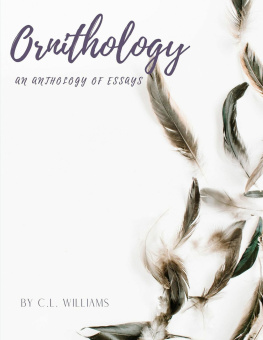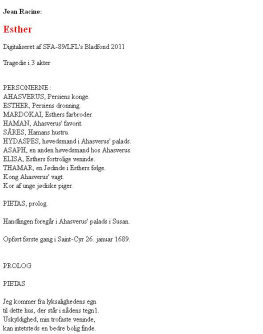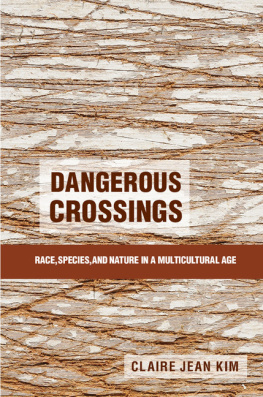Claire Cornillon - Phaedre by Jean Racine
Here you can read online Claire Cornillon - Phaedre by Jean Racine full text of the book (entire story) in english for free. Download pdf and epub, get meaning, cover and reviews about this ebook. year: 2015, publisher: BrightSummaries, genre: Art. Description of the work, (preface) as well as reviews are available. Best literature library LitArk.com created for fans of good reading and offers a wide selection of genres:
Romance novel
Science fiction
Adventure
Detective
Science
History
Home and family
Prose
Art
Politics
Computer
Non-fiction
Religion
Business
Children
Humor
Choose a favorite category and find really read worthwhile books. Enjoy immersion in the world of imagination, feel the emotions of the characters or learn something new for yourself, make an fascinating discovery.
- Book:Phaedre by Jean Racine
- Author:
- Publisher:BrightSummaries
- Genre:
- Year:2015
- Rating:3 / 5
- Favourites:Add to favourites
- Your mark:
- 60
- 1
- 2
- 3
- 4
- 5
Phaedre by Jean Racine: summary, description and annotation
We offer to read an annotation, description, summary or preface (depends on what the author of the book "Phaedre by Jean Racine" wrote himself). If you haven't found the necessary information about the book — write in the comments, we will try to find it.
Phaedre by Jean Racine — read online for free the complete book (whole text) full work
Below is the text of the book, divided by pages. System saving the place of the last page read, allows you to conveniently read the book "Phaedre by Jean Racine" online for free, without having to search again every time where you left off. Put a bookmark, and you can go to the page where you finished reading at any time.
Font size:
Interval:
Bookmark:
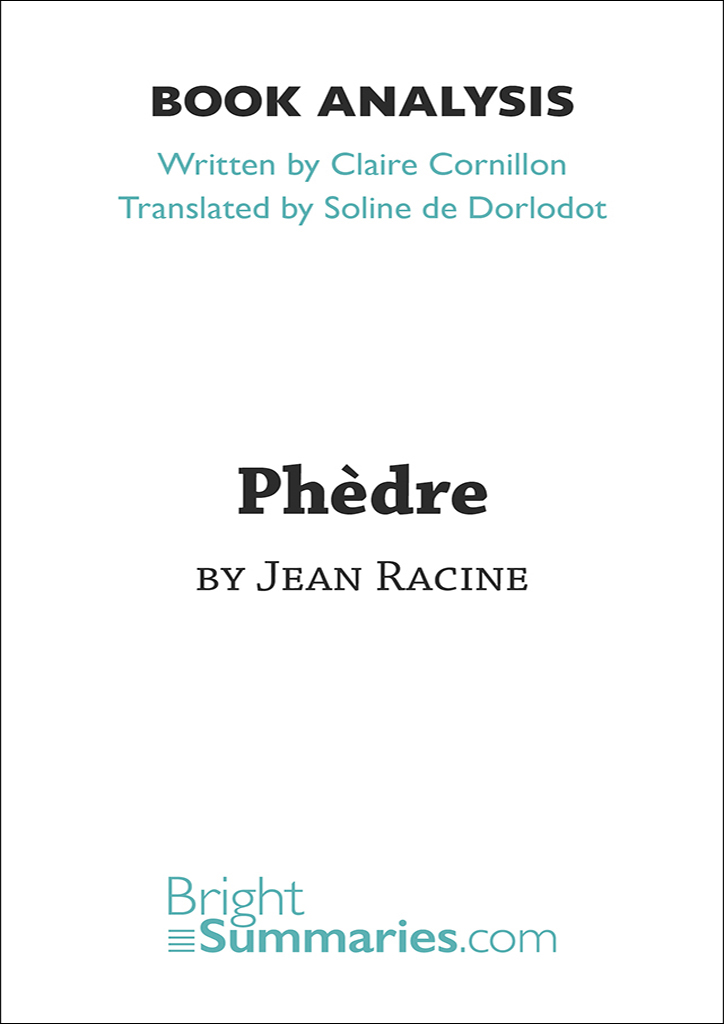

- Born in 1639 in La Fert-Milon
- Died in 1699 in Paris
- Notable works:
- Andromaque (1667), tragedy
- Britannicus (1669), tragedy
- Brnice (1670), tragedy
Jean Racine (1639-1699) was the main representative of classical tragedy of the 17th century just like Molire (1622-1637) is of the comedy. After an advanced education at the Abbey of Port-Royal, he settled in Paris where, from 1663 onwards, he was admitted to Louis XIVs court and led a brilliant career as a playwright. Mainly remembered for his tragedies, he wrote eleven of them. These tragedies, written in a poetic yet simple style, took their inspiration from Greek mythology (Andromaque), Roman history (Britannicus) or Christian history (Athalie) and explored human passions.
- Genre: theatre play (tragedy)
- 1st edition: 1677
- Themes: passion, suicide, order, transgression
Phdre is one of Racines most famous plays and was performed for the first time in 1677. This tragedy of five acts was originally written in verse, although this feature has not been retained in the English translation, and depicts the incestuous love of the eponymous character, Phaedra, for her husbands son, Hippolytus. This character from Greek mythology is a tragic heroine because she is ruled by her guilty passions and therefore causes the misfortune of all those around her, including Hippolytus. In the end, she kills herself.
The scene is set in Troezen, a town of Peloponnesus. Nobody knows whether Theseus, the King of Athens, is still alive. Hippolytus, his son, decides to go looking for him. Moreover, Phaedra, Theseus wife, seems to hate him and he wishes to leave Troezen. He explains to his governor, Theramenes, that: That happy time / Is gone, and all is changed, since to these shores / The gods sent Phaedra (Scene 1). Hippolytus is in love with Aricia, the sister of Theseus enemies. He states: By my father's stern command / Her brethren's blood must ne'er be reinforced / By sons of hers (Scene 1).
Phaedra is dying. Oenone, her nurse and confidante, wonders what she is suffering from. Phaedra confesses to her that she nourishes an incestuous love for Hippolytus, her husbands son. She says that the first time she saw him, I look'd, alternately turn'd pale and blush'd / To see him, and my soul grew all distraught (Scene 3).
Theseus death is announced, and Oenone advises Phaedra to succumb to her feelings, as she is now a widow: The King's decease has freed you from the bonds / That made the crime and horror of your love (Scene 5).
Hippolytus reveals to Aricia that she is free and confesses his love for her. Phaedra wishes to talk to Hippolytus and ends up telling him that she loves him: I love. But think not / That at the moment when I love you most / I do not feel my guilt (Scene 5). Although she appeared to hate him, this was only because she loved him: Twas not enough for me to fly, I chased you / Out of the country, wishing to appear / Inhuman, odious; to resist you better, / I sought to make you hate me (Scene 5).
Theramenes announces to Hippolytus that Phaedra's son is the new king. However, rumor has it that Theseus is alive. Hippolytus wishes to know more.
Oenone announces to Phaedra that Theseus is alive and advises her to accuse Hippolytus of loving her, in order to counter any accusation he might make against her: Venture to accuse him first, / As guilty of the charge which he may bring / This day against you (Scene 3).
Theseus returns. Hippolytus wants to leave Troezen to prove his valor.
Oenone tells Theseus that Hippolytus was in love with Phaedra. Theseus, in his anger, calls upon Neptune and asks him to punish his son: Avenge a wretched father! / I leave this traitor to thy wrath; in blood (Scene 2). Hippolytus defends himself by confessing his love for Aricia, but his father does not believe him.
Phaedra comes to defend Hippolytus and Theseus then tells her that he says he is in love with Aricia.
Phaedra exclaims: Ye gods, when, deaf to all my sighs and tears, / He arm'd his eye with scorn, his brow with threats, / I deem'd his heart, impregnable to love, / Was fortified 'gainst all my sex alike. (Scene 5). She then becomes very angry with Oenone, whom she blameses for having advised her badly by suggesting that she accuse Hippolytus.
Aricia asks Hippolytus to tell his father the truth about Phaedras feelings for him, but he refuses: How should I venture, by revealing all, / To make a father's brow grow red with shame? (Scene 1). He asks her to leave with him, but as they are not married, she is fearful that her honor will be sullied. He then offers to marry her. She accepts.
Aricia tells Theseus that he had accused his son unjustly, but does not tell him the truth about Phaedra. Theseus has doubts. He is told that Oenone committed suicide and that Phaedra also wants to die. He understands that he might have been mistaken: Be not hasty to bestow / Thy fatal bounty, Neptune; let my pray'rs / Rather remain ever unheard. Too soon / I lifted cruel hands, believing lips / That may have lied! (Scene 5).
Theramenes arrives to announce Hippolytus death to Theseus. Hippolytus was killed by a monster from the sea. Phaedra, who has consumed poison, comes to confess the truth to Theseus before taking her last breath. She dies.
Phaedra is the daughter of Minos and Pasiphae, who is known for having given birth to the Minotaur, a half-man, half-bull monster. Indeed, Minos had offended Poseidon, the Greek God of the seas, and to avenge himself, the latter had Pasiphae fall in love with a bull. Phaedras family is thus marked by a cruel and tragic fate.
She is the wife of Theseus, King of Athens, but she has fallen in love with his son, Hippolytus. Due to this transgression, she triggers a tragic process which can only end in death. To this first transgression, she adds a second one, as she blames Hippolytus to save herself from her own faults, thus causing his death. In this vicious circle, one fault gives rise to another.
The play bears her name and she is the central character. Cruel in the eyes of Hippolytus, her attitude hides her deep love for the young man. She is a woman whose feelings are exacerbated, she is ruled by her passions: she bears a guilty love for her husbands son, but she also unleashes her wrath on her confidante, Oenone, consequently causing her suicide. Finally, she is jealous of Aricia and of Hippolytus love for her.
From the beginning of the play, her physical state is an echo of her moral suffering and the whole play can be seen as the progress of her agony, up to her death by poison. She withers, eaten away by her secret and her guilt - a guilt first caused by her love, then by the harm she brings. E'en in my arms a secret malady / Slays her, says Oenone in the second scene. Also when she arrives on stage, she paints a pathetic portrait of herself: Ah, how these cumbrous gauds, / These veils oppress me! What officious hand / Has tied these knots, and gather'd o'er my brow / These clustering coils? How all conspires to add / To my distress! (Act I, Scene 3). Unable to bear the situation, she finally confesses the truth before putting an end to her life in the final scene.
Font size:
Interval:
Bookmark:
Similar books «Phaedre by Jean Racine»
Look at similar books to Phaedre by Jean Racine. We have selected literature similar in name and meaning in the hope of providing readers with more options to find new, interesting, not yet read works.
Discussion, reviews of the book Phaedre by Jean Racine and just readers' own opinions. Leave your comments, write what you think about the work, its meaning or the main characters. Specify what exactly you liked and what you didn't like, and why you think so.

